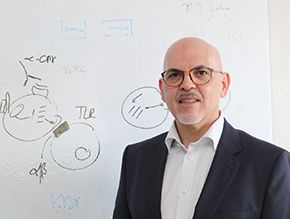Close to the Action: Dr. José Luis Cabero, CEO, AELIX Therapeutics
Pharm Exec talks to AELIX Therapeutics' Dr. José Luis Cabero about how the major career and country shift he made a decade ago have motivated and sustained a new direction in his career.
Barcelona-based AELIX Therapeutics is a biotechnology company focused on the development of a therapeutic HIV vaccine to be used in cure/eradication strategies. AELIX is a spin-off of HIVACAT, a Catalan public-private consortium conducting cutting-edge research in the field of AIDS and related diseases, led by the IrsiCaixa Aids Research Institute and the Infectious Diseases and AIDS Unit of the Hospital Clínic of Barcelona The company was incorporated in November 2015 and completed a €11.5M ($12.5M) Series A funding shortly thereafter. In June 2018 it was ranked by Business Inside as one of Spain’s most innovative biotech companies.
After 16 years at AstraZeneca in Sweden, where he held various positions in the gastrointestinal and cardiovascular R&D organizations, Dr. José Luis Cabero moved to Spain in late 2008 to focus on vaccine and immunotherapy development. He served as CEO of the Spanish biotech companies Archivel Farma, ALGENEX and Chimera Pharma, as well as Chief Innovation Officer at Laboratorios LETI, before joining AELIX as interim CEO in February 2017. He was appointed permanent CEO nine months later.
Dr. Cabero sat down with Pharm Exec to discuss how the career and country shift he made a decade ago, and his commitment to AELIX, have motivated and sustained a new direction in the later stages of his career.
Pharm Exec: You took the decision pursue biotech opportunities at age 50, after 16 years at AstraZeneca. Was this a risky move for you?
Jose Luis Cabero

José Luis Cabero: I very much looked forward to moving to the biotech environment. My last period at AZ was invested in creating a spinoff, called Albireo Pharma, which was very successful, raising €25m from major international investors. I had a senior management role when I left AZ, but I wanted to get closer to the action, and I knew the biotech environment would offer me that. It was a risky move to some extent; I made the move at the start of the financial crisis in 2008 and some things didn't work out as well as I wanted them to at the very beginning. But that was more related to the financial situation than anything else. I was keen to work in other therapeutic areas, to work outside the area of small molecules in vaccines and biologicals, and that’s what I’ve mainly been doing since moving to Spain. So, it was a good thing for me. It has been extremely exciting to further my development as a professional and as an individual.
What attracted you to Spain after spending much of your career in Sweden, and how different have you found the Spanish working environment?
I was born in Argentina; I have Spanish ascendants on my father side and German ascendants on my mother side, and I feel very comfortable in Europe. In 2007/2008, when my wife and I were exploring options in different parts of Europe, Barcelona was being referred to as an emerging cluster. I was contacted by a head hunter who was looking for an experienced person to be the CEO of Barcelona-based biotech company (Archivel Farma), and they offered me the position. I thought it was a good opportunity and so decided to take it.
I think the management style in Spain is still quite hierarchical compared with Northern Europe, particularly Scandinavia, which is much more consensus-oriented. In Sweden, they look for consensus, perhaps excessively so sometimes. They take extra time maturing rather than pushing decisions, but once decisions are made they are firmly executed and there is no room for questioning, no room for doubt. Diversity is another important element. Inclusion, diversity, and taking time to mature and understand decisions, I would say, define the Swedish management style. While Spain is very traditional, things are changing. It has been an interesting exercise for me to bring over that inclusive Swedish management style, and also to evolve from my traditional big pharma approach and develop skills in managing biotech companies. I’ve tried to pursue a more informal approach that promotes consensus communication and pushes for alignment and understanding of the decisions that need to be taken.
What drew you to Aelix and what's exciting about the company?
When I was contacted by some of the AELIX investors, who I knew and had a good relationship with, I had taken the decision to slow down a little bit in my professional engagements and to work more in a freelance capacity. In early 2017, the investors were looking for some management support. I said, OK, I could invest a few months of my time supporting you, and I came on board as interim CEO. I found that the set-up at AELIX was very interesting, bringing innovation to a very challenging field. We worked in the first half of 2017 to strengthen and align both the management team and the board. When I was offered the permanent CEO role, I saw that with my management and multi-disciplinary experience, I was a good fit. And I realised that, at this stage of my career, to work with a qualified team who are known and respected in an area of a significant major need, to contribute to the offering of new therapeutic options, and to work with valued stakeholders were fantastic opportunities. I'm very happy to have taken the decision to join AELIX. We are now progressing with our first clinical trial, for the assessment of AELIX’s proprietary HTI vaccine, and so far, we have seen that the vaccine is well tolerated. So my early-2017 plans to slow down have been abandoned for the time being!